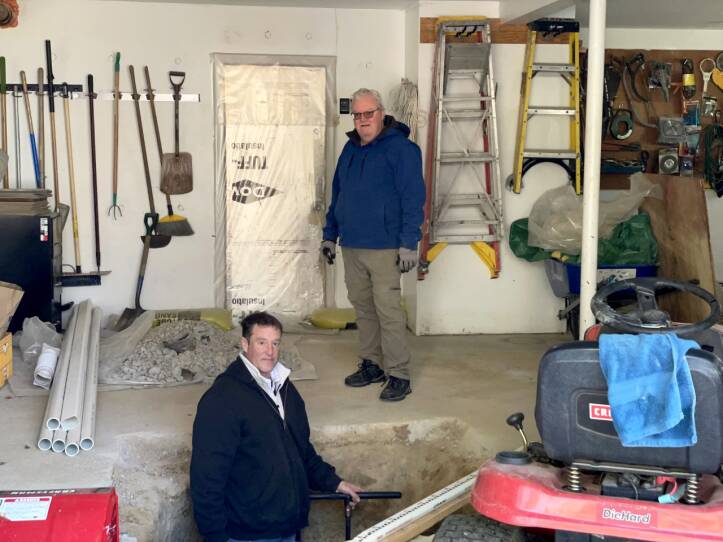More than 650,000 Massachusetts homes are heated with oil, but only a tiny fraction — just 7% — of those homeowners have insurance policies that would help cover the costly cleanup should their oil tank leak and spill oil into the ground.
For years, advocates have pushed for legislation to mandate coverage instead of it being an add-on to existing homeowners' insurance policies. It’s coverage that costs less than $100 a year, but without it, homeowners could be on the hook for hundreds of thousands of dollars in environmental cleanup.
That’s what happened to Kevin Hurley of East Bridgewater.
“I got a letter in the mail that said they weren’t covering it,” he said, recalling the reaction from his insurance company following a nearly 200-gallon home heating oil spill.
Back in August 2021, Hurley was hospitalized with COVID-19 and suffering from breathing issues when he got word from his son that his storage tank had leaked oil onto his garage floor. A recent inspection of Hurley’s oil tank had shown it was up to code. When he learned his homeowner’s insurance wouldn’t cover the cost of the cleanup because he hadn’t purchased the optional oil spill rider, he was in shock.
“I was in a panic,” he said, “because I don’t have, you know, $200,000, $300,000 or $400,000 to fix it.”
Over time, water and sediment can corrode steel storage tanks from the inside out, meaning homeowners and inspectors may not see damage before it's already done. It's possible an inspection of the bottom of the tank would not reveal an issue. Leaked oil can then seep into groundwater, private wells, nearby lakes or rivers, and also could migrate to neighbors’ properties. Every spill requires careful remediation from trained professionals.
Kevin Beaulieu, senior project manager with Wave 2 Environmental, is an environmental engineer working with Hurley to clean up the oil spill that found its way down two floor drains in his garage. Beaulieu belongs to the non-profit Licensed Site Professionals Association, known as LSPA, that oversees hazardous waste cleanups and is pushing for the legislation.
“Our job is to get the site cleaned up,” he said, and “ultimately to determine what type of environmental impact there is, how extensive it is, the sensitivity of the surrounding environment and where our exposure pathways might be.”

Every year, between 100 and 200 uninsured home heating oil spills are reported to the Massachusetts Department of Environmental Protection. But that does not reflect the true extent of the problem, because only spills over 10 gallons have to be reported.
“It’s not a rare occurrence,” said Wendy Rundle, executive director of LSPA, which includes scientists, engineers and public health officials with expertise in waste cleanup issues.
Critics of existing legislation point to a clause that says insurance companies need only to “make available” insurance to homeowners. So if a homeowner asks for oil spill coverage, the insurer must offer it. The problem, according to the LSPA, is that many homeowners don’t tap into this option because they don’t know it exists.
Rundle said LSPA supports legislation that would require insurance companies to automatically provide that coverage and make it a standard part of homeowners’ insurance. “People wouldn’t have to ask for it,” she said.
The legislation would require the cost of the coverage to be spread across all homeowners’ policies, not just homes that heat with oil.
Attorney Susan Crane represents homeowners and has spent 30 years helping clients through the financial calamity of a home heating oil spill.
Crane emphasized that the cost of a remediation can run into hundreds of thousands of dollars, causing some homeowners to wipe out their retirement funds or life’s savings to pay for these environmental cleanups. It’s been her quest to help pass the the bill, sponsored by state Sen. Anne Gobi, which would mandate insurance companies cover spills.
“Homeowners are unaware that for less than $100, they can annually purchase a liquid fuel rider that will give them coverage for oil spill cleanup costs,” Crane said.
Gobi said a small change will fix the current law and make insurance companies provide mandatory coverage and protect unsuspecting homeowners. “People don’t realize they have the ability to have a rider on their insurance for it, and just don’t do it,” she said.
The Massachusetts Insurance Federation asserts the existing law is sufficient and argues the bill doesn’t do enough to require the tanks are up to code before insurers have to cover potential spills.
“We are adamantly opposed to this legislation as drafted,” said executive director Chris Stark.
His group wants to make sure that a homeowner provides proof of compliance to be eligible for this coverage, and gets inspections to make sure their fuel tank is in good working order. Stark wants the onus to be on fuel oil companies.
“And so that is key to this because we want to make sure that this is not a presently occurring loss or an ongoing loss prior to the establishment of that coverage,” he said.
Advocates agree that an annual inspection from a customer’s oil company is a good idea, but more importantly Rundle said that a rider for coverage of fuel oil spills “would literally be a life saver for many homeowners.”
Crane represents a Wareham couple that recently had a massive home heating oil spill and put a spotlight on the coverage issue. As a result, many oil companies across the state report customers calling about the need to purchase insurance, and want to get the required certificate, too.
“It’s called Form 1A, and all it does is certify that the oil tanks and oil lines ... are up to code,” said Thomas Markarian, president of Metro Energy of South Boston. “They get that form from their insurance company to get coverage.”
Stark suggests an alternative to the proposed insurance mandate would be to increase public education about the availability of insurance coverage. And he said the state should place responsibility on home heating oil delivery companies to provide notice about the law and any issues with the customers’ heating oil tank.
Along with purchasing a liquid fuel rider from their insurance company, there are several things homeowners can do right away. Crane suggests homeowners make sure their heating system is safe and up to code. Double-walled oil storage tanks are also available for purchase, and while they’re more expensive, she argues it’s worth the price.
“The tank is a ticking time bomb,” she said.








